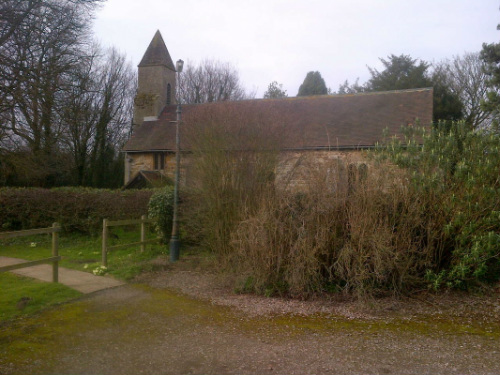|
Often when I can’t sleep, I go back, in my mind, to my grandmother’s farm in rural Nottinghamshire – Stanton-on-the Wolds. I walk past the brick pigpens, down the cobbled lane to the yard, where skinny black cats cluster round a dish of milk and bread – into the room with its surround of Belfast sinks, and smell of raw egg, where we helped my aunt size the eggs on a strange Bakelite object with a pin that popped through a slot. I go on into the kitchen, where damp kittens nest in a box under the sideboard. The sun slants through the window, and cats tiptoe along the edges of furniture. I hear the loud voice of my uncle, and the sound of his wellingtons slapping the stone flags. Out in the hall, beyond my grandmother’s sitting room, I’m lost. Try as hard as I may, I can’t recall my uncle’s study – only a memory of him sitting at a huge untidy desk in the half light of evening. It frustrates me that I can’t remember accurately and there’s nobody left to ask.
We only ever visited Laurel Farm in Whitsun and August – leaf shadow, shafts of sunlight through grain dust in the chicken sheds, the dirty yolk of shattered eggs in the straw, and the soft rumbling song of the chickens. We walked with my aunt, down lanes deep in cow parsley and may blossom, to feed the chickens and collect the eggs. Early in the morning I lay under piles of eiderdowns in my grandmother’s bed, and heard the men calling to each other below her bedroom window. I was a child of suburbia, and this was a kind of paradise. Yesterday, nearly forty years later, we went back to the farm for a visit. The present owner, very kindly, offered to show us around. It’s become gentrified, all the outbuildings converted into houses, a smell of wealth. The egg room, and my grandmother’s kitchen have been demolished, the kitchen garden buried under a patio. There are no chicken sheds, no cats, no paddock where Friesian cows graze around a track leading to the church. I looked from the outside, through plastic framed windows that had never existed then, unable to see the interior of my grandmother’s sitting room, or climb the narrow stairs to her bedroom, to hear the click of the latch as the door opened. We crossed the field to the church, saw my uncle’s grave. I longed to stand in the churchyard and feel the quietness of the dead, but we were being shown around. Our hostess was a talker and had much to tell us. Until yesterday I’d forgotten the sharp, vertiginous ache of being shut out, of something being so near and yet unreachable. Laurel Farm was lost to us very suddenly. My uncle died in January 1977. Neither my sister nor I went to his funeral. Overnight my poor grandmother lost her beloved son, her home, and her much adored cat. I remember my mother, usually so cheerful, returning from the funeral and taking to bed, her face grey and old and exhausted. It’s not that I idealise my mother’s farming family. They were an odd bunch, volatile, unforgiving at times, with inexplicable estrangements, and much whispering behind closed doors. There were whole areas of the farmhouse where we children weren’t allowed, and a sense of claustrophobia that became more apparent as I grew up. But I loved them, and I loved the land – the wide sweep of the wooded wolds, the restful sky, the soft red brick and steep pitched roof of the farm, the shadowy interiors full of sounds and smells. I should have known – or perhaps I hoped it would be different. What once existed, and was loved, has gone forever, reachable only through the mind, unreliable memory, the imagination.
0 Comments
Leave a Reply. |
AuthorTricia Durdey dances, writes, and teaches Pilates. Archives
October 2017
|

 RSS Feed
RSS Feed